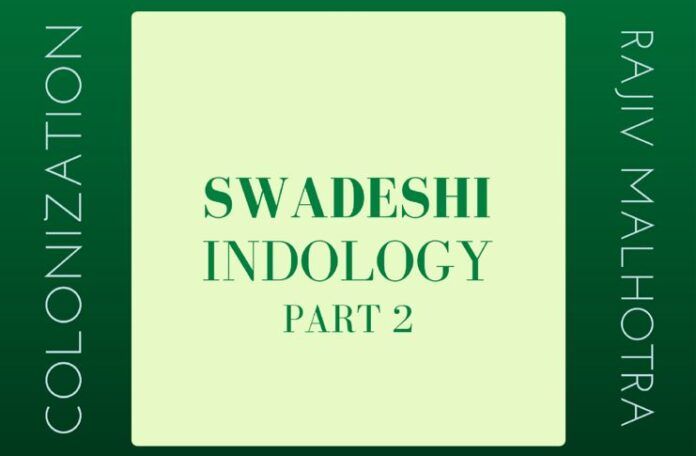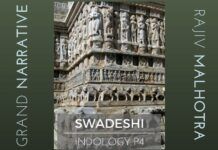
Part 1 of this series can be accessed here. This is Part 2.
[dropcap color=”#008040″ boxed=”yes” boxed_radius=”8px” class=”” id=””]N[/dropcap]ow colonization is not the same thing as being oppressed. You can be oppressed, but if you resist the oppression, if you don’t accept the oppressor’s point of view, you are not colonized! You become colonized when you accept it. When you accept that he is superior, I am inferior. He knows more, I know less. What he is saying about me must be correct. I have to listen to him, I have to bow down to him. So, you become colonized when you accept the dominant cultured oppressor’s point of view. So Gandhi for example, was not colonized. He was oppressed. They would beat him up, he would have blood coming and he would be taken to jail. So they certainly oppressed him and did all kinds of horrible things but you can’t say he was colonized.
Most people think colonization started with the Europeans. They forget the Mughal’s colonization. We’ve been colonized by the Mughals, for a longer period.
So now, the reason I am differentiating is a lot of people think, we became decolonized just because we got Independence. That Independence gave us political freedom, sovereignty certainly, oppressiveness wasn’t there anymore now recently we’ve also got economic freedom and we are beginning to assert ourselves politically. But ideologically and intellectually we are colonized. This is what I am going to talk to you about. Now colonization has been of many kinds.
Most people think colonization started with the Europeans. They forget the Mughal’s colonization. We’ve been colonized by the Mughals, for a longer period. They brought in Turkish categories and Arabic things, and forced these on us. We gradually accepted this as a part of our life, particularly in the North. So, we are so colonized that we are not even conscious that we are colonized but actually we are. There was a Mughal colonization before European colonization. This is one of the point I want you to take away that we should stop thinking colonization only means western colonization. We were very heavily colonized by the Mughal effect, because it was not something that was brought by peace. It was forced on us. It was very alien, was foreign, and in the process, a lot of destruction took place. All that is well documented.
[dropcap color=”#008040″ boxed=”yes” boxed_radius=”8px” class=”” id=””]T[/dropcap]hen, in the European colonization, the Portuguese were very different from the British. The Portuguese were working very closely with the Vatican, were translating Mathematics from a lot of Mathematics texts and medicine texts, agricultural texts, botany texts to Latin. Huge amount of Indian knowledge, proprietary knowledge reached Europe through that route and it influenced a lot of scientific things. But British Indology was more general. British took over more areas. So, the study of India was tightly coupled with rule, policy-making. If you look at the parliament debates and if you look at the papers of the East India Company, the Indologist is a part of the think tank, on what to do with India, how to deal with Indians and we of course honour these Indologists. There was a World Sanskrit Conference in Delhi in 2010, where I was one of the keynote speakers. A big, beautiful book was published by the organizers – Rashtriya Sanskrit Sansthana. The book starts with, “Thanks to Sir William Jones, for giving us this great knowledge of Sanskrit” and then one other British Indologist and then another fellow – together with their photograph and biography and how great they are. And the people who do that are our own people. So that is why they are colonized because they are still idolizing these Indologists after all this time. Now what Mr. William Jones did, is written in my book ‘Battle for Sanskrit’.
The first Varna they captured was Business.
This whole history of Indology needs to be documented. I had started this project several years ago. In this project multiple volumes will be required.
Now the knowledge they got of India, allowed them to negotiate one King versus another because they knew this is Hindu-Muslim, this is this fellow, this is that culture. They were able to divide and rule different kinds of Indians by having studied all this very closely. The British, captured all three Varnas, systematically.
The first Varna they captured was Business. The Vaishyas, the traders, the people who created wealth because East India Company was a business enterprise. It was a Vaishya enterprise. It was multinational. So first they came and captured the money part. Creating wealth. Started as traders but then they started domestic production, taking over domestic production of various things and then moving that production over to England. Moved Steel production to England. Moved textile production to England. Till then India was a producer of Steel and Textile. So they were basically Vaishyas.
And once they captured the money machine, the wealth creation then the next Varna they captured was Kshatriya. They started overtaking the King’s role. So they took over one King after another. The Madras Presidency, Bengal, and like. They kept spreading. So the Police came under the British. The army came under the British. The sepoys, Indians, were all very proud working for the British carrying the Union Jack flag. Felt proud we have been selected to carry the “Jhanda”(Flag). That was the psychology of the colonized people. The Indian King was just symbolic. He would be told you could sit on an Elephant, we will give you a salute, play Polo with you and your son can go to Cambridge and there will be lot of women and he can date them and come back. So, they gave them a “Laat Sahab”(Lavish) lifestyle. The king could live a good “Laat Sahab”(Lavish) lifestyle and of-course the British were running the show. It is the oldest and the largest skill outsourcing company in the world, The British East Indian Company, because they asked the King that you outsource your governance to us. Imagine somebody comes and says, we’ll occupy Rashtrapati Bhavan, we’ll run the Army. All the Generals will be ours, we’ll run the Police, we’ll run the Courts. We’ll do the tax collecting and we’ll keep 95 percent because it costs us to do all this. So we are going to run the country for you and you will symbolically the “Raja”(King). You’ll still have that palace and so on. This is really what went on for a long time.
[dropcap color=”#008040″ boxed=”yes” boxed_radius=”8px” class=”” id=””]A[/dropcap]nd once they had both the wealth production and the political military power, then came the Brahmins. They had already created the “Bheda”(differences), a lot of conflicts between the Kshatriya and the Brahmin. So then came Macaulay. By the time, Macaulay came, British had already done all the mischief. By the time Macaulay comes and says, get rid of Sanskrit, get rid of Paathshalas and the way to bring them down is to demoralize them and make England look better and the English culture look better – the foundation has already been laid. That was their mental colonization which I am talking about.
Only 2 percent of the share of media in India is English.
Now we have gotten freedom in two Varnas, the political Varna of Kshatriyata and now recently the Vaishya, corporate, business Varna. But we have not got the freedom of the Intellectual capital. This is because we still follow western models, western categories, and western vocabulary. Even I am speaking English. Only 2 percent of the share of media in India is English. The CEO of Times of India told us, some couple of days ago. He agreed to this figure of only 2 percent. But that 2 percent of the power is critical. English is the language used by courts. Courts make decisions and the books which are published on Case Law have to be read so that if you are fighting a case. The lawyer has to read all the case laws in order to know how to argue a case and all these books on Case Law are in English. So obviously, the fellow has to go to some English speaking lawyer who knows how to read all these things to represent him. So much of the ruling is done in English, and it is increasing. People who are drivers, servants, people coming from villages to work as labour in Delhi, one of the first thing they want to do is to send their children to an English-medium school so they become “Sahab” (Officer), when they grow up. Their idea is that English is superior. So this is all the effect of colonization, so we cannot ignore, we cannot deny that we are colonized people.
The Indology took what was useful, and digested it into western language, western framework, lots of philosophy, linguistics, mathematics, a lot of knowledge was digested and what didn’t fit, what was scary and threatening – they rejected it, distorted it, accused it. They created that kind of a negative impression. And writing of history was a political weapon. The three volumes of “History of India” by James Mill, was the standard required text for every East India Company official being sent to India. Before being sent to India, they were given courses on Indology and they would be told all kinds of things, they have authored these things and so their version of Indian history was standard for many decades. And then other people wrote similar books that replaced these books, but core approach remained same. If you read these books, on what the British wrote about the Indian history you will be quite surprised to see how much of that is still in our books. We have continued teaching the same sort of stuff. So this went on and our ‘Parampara’ system broke as a result. The Sampradayas, the continuity broke. Now, after Independence, things didn’t get better, in some ways it got worse.
Some movements started to decolonize Indians intellectually. On the Hindu side, until 50 years ago, things were being produced, for example: Shri Deendayal Upadhyay ji wrote wonderful stuff to decolonize but nothing was continued after that, no Parampara, they did not continue that work and update it. People started idol worshipping those books rather than really continue that line of thinking and adding more knowledge.
[dropcap color=”#008040″ boxed=”yes” boxed_radius=”8px” class=”” id=””]B[/dropcap]ut Left has been more enterprising, they’ve had five ways of Indology since Independence. Five ways! They did not stop with what they were doing 50 years ago. They continued advancing it. The reason I am going through these five ways now, tell you what they are in a summary, is because you must know what we are up against. It’s not good enough to say “Pachaas saal pehle”(Fifty years ago) that book was written so we don’t need to do anything. That’s like saying 50 years ago, we knew the weapons of Pakistan and we had countermeasures so we don’t have to worry. The point is the battlefield is not static. The enemy has advanced their weapons from what it was 50 years ago and we’ll be foolish if we don’t do more research and keep up with it and develop our own counter measures. So, we must keep track of the new schools of Indology. It is not enough to say, 50 years ago we had a good school of Indology or a good school of our Hindu response and we are done because we are not. Things have changed. So, I will go through these five that the Left has created. Note that all five are important. Not one of these ideologies are developed indigenously. They are all Videshi.
Now this subaltern studies, was encouraged by Indira Gandhi because she needed vote-banks for her political power.
So first came Marxism. This is well known. The idea, it came through Soviet Union but also the Liberal English people, who were also very leftist oriented. So they brought Marxism. You cannot just keep criticizing Marxism and think I have decolonized because I have a response to Marxism. That is just one of several waves.
The second was, Post-Colonial Studies. Post-Colonial studies started when Edward Said wrote a book called Orientalism, very well-known book. These studies exposed the techniques of the colonizers. Said was himself a very add up person, very brilliant man. And so, the Indians took the study of colonizers, a lot of research went on, 1800’s-1700’s, what the Europeans were doing but the Drishti with which, the post-colonial has been done is not the Vedic Drishti. It is not an Indian Drishti. It is a Marxist Drishti. It is a Marxist critique of the colonizer. So it’s one western school criticizing the other. It is not an Indian school of thought of criticizing them. It is one western school of thought criticizing another.
Third wave was Subaltern studies. Subaltern studies is that you champion the underclass, the downtrodden, the people who don’t have a voice. The Dalits, minorities, women, these kinds of people. So the whole idea of relooking the Indian history through the eyes of these Subalterns became fashionable, which mean the idea of India was attacked. India as an idea is to be attacked because it is supposedly a negative idea, it is an oppressive idea. India as a construct is an oppressive construct. Look what it has done for so many years to all these people. So we are now having the product of all these fragmentation of regionalism, vote-banks. Now this subaltern studies, was encouraged by Indira Gandhi because she needed vote-banks for her political power. So the timing is very interesting. Subaltern studies is invented in the West, Indians pick it up. So that’s the time Indira Gandhi needs it for vote-bank politics. So, it’s encouraged and that’s the age of Ramachandra Guha and all these kinds of people who became the champions of Subaltern studies. Huge subaltern study movement starts. When these people are trained, they learn Marxism, then they learn post-colonial next layer, then they learn subaltern studies.
Fourth came, post-modernism. Post-modernism means that you break up the narrative of India. You just take it apart. Ramayana is about domination and oppression, Vedas are about that. They’ll take away every aspect of Indian life and reduce it to political oppressor-oppressed, master-slave and that’s how it is.
The latest is what we are calling Neo-orientalism – a school led by Sheldon Pollock. My book ‘The Battle for Sanskrit’ is actually a critique of this movement. It is very important not to say that Everything is the same because “infection is not the same”. So you can’t dismiss it and say I already know Marxism, I know what Max Mueller did, I know what Macaulay did so I don’t have to study. You have to study each one of them if you are a serious scholar.
Part 3 of this post can be accessed here…
You can get connected with Rajiv in any one of the following ways:
Join Rajiv Malhotra for his FB LIVE Broadcasts. Follow Rajiv on facebook.com/RajivMalhotra.Official
Twitter: https://twitter.com/RajivMessage
You Tube Video of Rajiv Malhotra: https://www.youtube.com/user/BreakingIndia
Rajiv’s discussion egroup: http://groups.yahoo.com/group/RajivMalhotraDiscussion/
Email address : Infinity.Foundation.India@gmail.com
Note:
1. Text in Blue points to additional data on the topic.
2. The views expressed here are those of the author and do not necessarily represent or reflect the views of PGurus.
- Part 2: Discussion between Dr. Swamy and Rajiv Malhotra - September 10, 2017
- Dr Subramanian Swamy In Conversation with Rajiv Malhotra - July 24, 2017
- P2 – Discussing the Digestion of Yoga with a White Hindu - July 3, 2017











Thank you again sir, but it is important to point out that answer is strong in group /out group separation. Japan understood very well since the coming of early christians, how colonialism operates, how local people get seduced by new languages and what they learn from it and eventually an entire industry develops. Colonialism is impossible without internal collaborators. British engaged in divide & rule policy with the help of knowledge they gained from anthropology studies & humanities. Humanities dept was very helpful for imperialism. One needs to teach people how humanities dept itself played a very important role in divide & rule policy. Now west understands the old style conquest is not possible , so the new conquest is social conquest, by stirring social movements in other countries, shepherding movements which give them leverage in other societies. All in the name of liberalism. Because they understand the weakness in many developing societies is on social parameters. This is the point of entry & interference. Russia has done this with USA & Russia policy is also the same, US is also doing the same. It is important sir to explain every time as though one is talking to new people, so many useful idiots misunderstand u again & again because of that. Old policy was to divide & rule. New policy is to divide & shepherd. Be as cynical of ngos as u are about any other group of people including politicians.Be as skeptical of anyone as you are of me.